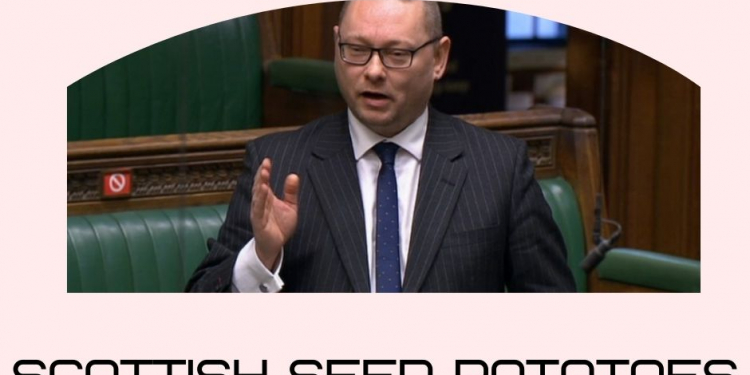MP Richard Thomson, representing the constituency of Gordon in the House of Commons, has again pressed the UK Government on the export of Scottish seed potatoes – currently banned – to Northern Ireland and the EU. The SNP MP was speaking in a debate in Westminster Hall yesterday (Wednesday) where he raised the matter.
Speaking in the debate, Mr Thomson said: “We have heard the saga of seed potatoes. I have some seed potato growers in my constituency. Their standards were already the highest in the world, and they have not diminished, but because the UK is not prepared to sign up to the same level of obligation and standards, they are virtually unable to export to what were always their most productive markets, even though those markets are desperate for the disease-free quality that those potatoes can bring.”
Richard Thomson went on to say that if there is an area “crying out for pragmatism”, it is that of multi-million pound trade.
“Europe needs our Scottish seed potatoes,” he said. “We have always exported them – as does Ireland. There is a reason our producers did not take up the opportunity to export east of Aden despite being encouraged to do so: it is because it is so difficult to do that. They have had a ready market taken away from them. All it requires is a pragmatic realignment, which will once again allow that world-leading industry to get on with doing what it does best.”
Mr Thomson went on to point out that part of the problem will go away with an agreement on sanitary and phytosanitary standards.
“Such an agreement has widespread support,” he said. “Back in June, the CBI was calling on both sides to negotiate a bespoke veterinary agreement, saying that it would end the friction that Brexit has caused, particularly to the food, drink and agri sector. The EU is clearly willing to sign up to such a deal; it has been signalling as far back as February that it would be open to signing that kind of bilateral deal with the UK.”
Commenting after the debate, Mr Thomson said: “The Minister for Farming, Fisheries and Food, who was sent out to defend this unholy mess showed some signs that she – perhaps alone within the UK Government – recognised that this cannot continue. The key test will be whether those supporters of a hard Brexit within the Conservative Government are willing to countenance any possible arrangement with the EU that the Minister proposes.”





